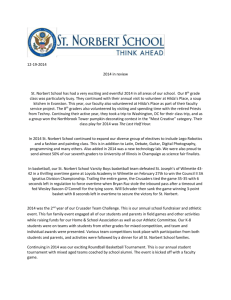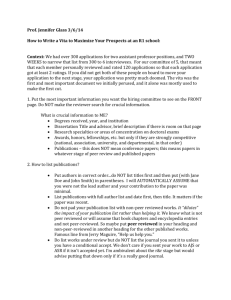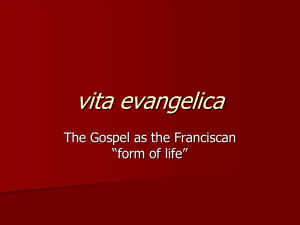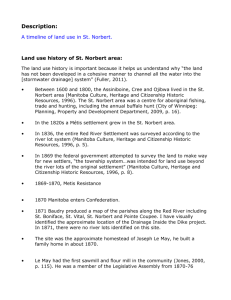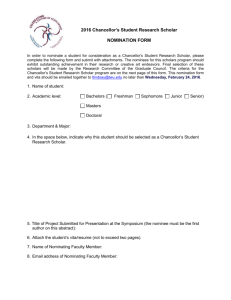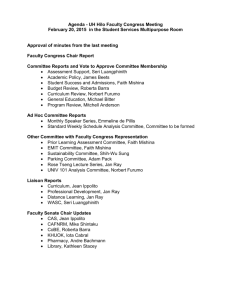Remarks on Norbert of Xanten
advertisement
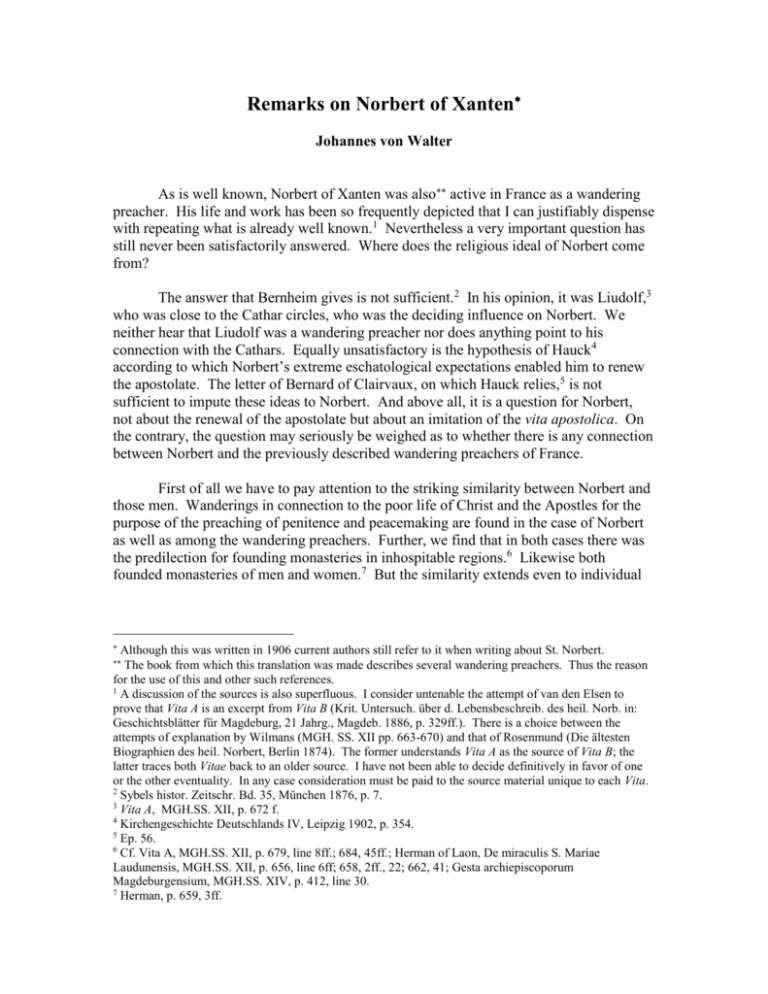
Remarks on Norbert of Xanten Johannes von Walter As is well known, Norbert of Xanten was also active in France as a wandering preacher. His life and work has been so frequently depicted that I can justifiably dispense with repeating what is already well known.1 Nevertheless a very important question has still never been satisfactorily answered. Where does the religious ideal of Norbert come from? The answer that Bernheim gives is not sufficient.2 In his opinion, it was Liudolf,3 who was close to the Cathar circles, who was the deciding influence on Norbert. We neither hear that Liudolf was a wandering preacher nor does anything point to his connection with the Cathars. Equally unsatisfactory is the hypothesis of Hauck4 according to which Norbert’s extreme eschatological expectations enabled him to renew the apostolate. The letter of Bernard of Clairvaux, on which Hauck relies,5 is not sufficient to impute these ideas to Norbert. And above all, it is a question for Norbert, not about the renewal of the apostolate but about an imitation of the vita apostolica. On the contrary, the question may seriously be weighed as to whether there is any connection between Norbert and the previously described wandering preachers of France. First of all we have to pay attention to the striking similarity between Norbert and those men. Wanderings in connection to the poor life of Christ and the Apostles for the purpose of the preaching of penitence and peacemaking are found in the case of Norbert as well as among the wandering preachers. Further, we find that in both cases there was the predilection for founding monasteries in inhospitable regions.6 Likewise both founded monasteries of men and women.7 But the similarity extends even to individual Although this was written in 1906 current authors still refer to it when writing about St. Norbert. The book from which this translation was made describes several wandering preachers. Thus the reason for the use of this and other such references. 1 A discussion of the sources is also superfluous. I consider untenable the attempt of van den Elsen to prove that Vita A is an excerpt from Vita B (Krit. Untersuch. über d. Lebensbeschreib. des heil. Norb. in: Geschichtsblätter für Magdeburg, 21 Jahrg., Magdeb. 1886, p. 329ff.). There is a choice between the attempts of explanation by Wilmans (MGH. SS. XII pp. 663-670) and that of Rosenmund (Die ältesten Biographien des heil. Norbert, Berlin 1874). The former understands Vita A as the source of Vita B; the latter traces both Vitae back to an older source. I have not been able to decide definitively in favor of one or the other eventuality. In any case consideration must be paid to the source material unique to each Vita. 2 Sybels histor. Zeitschr. Bd. 35, München 1876, p. 7. 3 Vita A, MGH.SS. XII, p. 672 f. 4 Kirchengeschichte Deutschlands IV, Leipzig 1902, p. 354. 5 Ep. 56. 6 Cf. Vita A, MGH.SS. XII, p. 679, line 8ff.; 684, 45ff.; Herman of Laon, De miraculis S. Mariae Laudunensis, MGH.SS. XII, p. 656, line 6ff; 658, 2ff., 22; 662, 41; Gesta archiepiscoporum Magdeburgensium, MGH.SS. XIV, p. 412, line 30. 7 Herman, p. 659, 3ff. 2 details. Norbert is also called “master”,8 his followers are called “poor of Christ”,9 and he also wanders barefoot10 and uses a donkey.11 It is clear that we are dealing with identical manifestations. When Norbert made his appearance the image of the wandering preacher was already popular for two decades. Dare we infer a dependent relationship from this overall analogy? I think this conclusion would stand even if we added nothing further. This is not the case, however. We have some evidence to justify this conclusion. When the Synod of Fritzlar had forbidden Norbert to wander about preaching, he appealed to the pope who overturned the judgment of the synod.12 Norbert was splendidly justified. What was more natural than that under these circumstances he take up again his activity in Germany? But he did not do so. It will certainly be correct if Vita A maintains the lack of success of Norbert’s efforts13 as the final reason for this. But why didn’t Norbert decide to wander about some other area of Germany? Why did he go to France? If Bernheim14 declares that Norbert moved to France mostly as a Lorrainer, this is a commonplace but not a reason.15 This explanation turns out to be absolutely impossible if we consider that Norbert understood no French. This fact is now firmly denied by Rosenmund.16 Only his explanation is not convincing. Above all Rosenmund reports the references in question17 in Vita B incorrectly. It is not a question of Norbert not understanding French and then suddenly through the inspiration of the Holy Spirit preaching in this language. Rather Norbert preached in German, allegedly in the hope that the Holy Spirit would make him understood by his hearers (in fact it may be a question here only of one of the added Bible citations that are so loved by B), and the effect of this is that the people of Valenciennes ask him to recuperate a bit in their city. I do not hesitate to accept this story as historical. It belongs to the source material unique to Vita B and contains nothing that is unimaginable. Should it really be too daring a thought to expect the religiously effusive Norbert to stand before and preach to a populace who did not understand his language? I recall only the similar event from the life of Vitalis or to 8 Very frequently in the Vitae; Herman, p. 656, 51; Guibert of Nogent, Tropologiae in prophetas Osee et Amos ac lamentations Ieremiae, PL 156, col.337D and 487B. 9 Vita A, p. 684, 42f.; Vita B, AASS, p. 816D; Vita Godefridi, MGH.SS. XII, p. 516, 34; 522, 15; Fundatio monasterii Gratiae Dei, MGH.SS. XX, p. 686, 32; Gesta arch. Mag. 412, 30. 10 Vita A, p. 675, 10; 677, 29; 694, 28; Herman 659, 53 and frequently. 11 Vita A, p. 689, 5; Gesta arch. Mag. p. 412, 27; frequently in Vita B. Very informative is a comparison of the terminology. We find in the sources for Norbert expressions such as: nudam crucem … nudus sequi: Vita B, p. 814E, cf. vita Godefridi, p. 515, 31 and Sigeberti Gemblacensis continuatio Praemonstratensis, MGH.SS. VI, p. 448, 11; imitator Christi: Vita A, p. 678, 39; Vita B, 819C and 838F; imitator paupertatis Christi: Vita A, p. 682, 1f.; vir apostolicus: Vita A, p. 681, 16; vita apostolica: Vita A, p. 678, 37 and 683, 20; Anselmi Havelbergensis dialogi I, cap. 10, PL 188, col. 1155A; imitator apostolorum: Vita A, p. 676, 30f., cf. Anselm of Havelberg, col. 1155A, and the expression coapostolus in Abaelard, Sermo de sancto Ioanne Baptista, ed. Cousin I, p. 590; paupertatis amator: Vita B, p. 819C and the concluding poem, MGH.SS. XII, p. 706, 22. 12 Cf. Hauck, loc. cit. p. 353f. 13 Vita A, p. 673, 31. 14 Loc. cit. p. 8. 15 As far as I understand, Norbert’s move to France is not felt to be a problem in all the other literature. 16 Loc. cit. p. 77; cf. also Hauck, p. 354, note 5. 17 Vita B, p. 815B. 3 choose a modern example the missions of the Quakers. The fact that people gather around him and someone offers a shelter to the strange holy man expresses nothing that strikes us as improbable. But we don’t even need this interpretation of the event suggested by Vita B, for Valenciennes is a city on the German-French border, where Norbert could hope to be understood if he preached in German. The statement that Norbert did not know French wins special support through the remark in Vita A that Norbert learned French in Laon.18 This passage belongs to the source material that is unique to Vita A and if Hauck19 wants to find an exaggeration here, then this opinion, it seems to me, leads nowhere. It is told with simple words, a fact without a secondary objective. But then the last reason to explain the report of Vita B as suspicious also fades away. The fact that Norbert did not know French is maintained by two sources independent of one another and this two-fold witness is not invalidated by such general considerations, as Norbert must have spoken French20 because he was a Lorrainer and a chaplain of the emperor. Nor should one bring up that Norbert just made a journey through France.21 Vita B maintains that he understood a smattering of French.22 He can very well have acquired some French without being qualified to preach in it. And finally if one objects that Norbert, before he came to Laon in November 1119,23 continued to wander about preaching for a time, then the question is settled by the fact that in these months Norbert without exception kept to the German-French border area.24 The question is repeated. How is it that Norbert, with the intention of pursuing wandering preaching, goes to France although he does not have a command of French? There must have been reasons of a very compelling nature that moved him to do so. One will say that he hoped to find a better base here. But on what did he ground this hope? To me there seems to be only one explanation. Norbert knew that in France people were accustomed to the image of the wandering apostle, while in Germany this was virtually a new phenomenon. If it is correct that Norbert knew of the wandering preachers, then it is difficult to ignore the conclusion that he must also have been influenced by them. Only then is it understandable why Norbert exchanged his homeland for a foreign country. Other observations are added here. We find Norbert in close connection with people who had connections with Bernard of Thiron, namely with Count Thierry of 18 Page 681, 17ff. That this remark comes up in connection with a miracle story (cf. van den Elsen, loc. cit. p. 343 f.) borrowed from Guibert of Nogent (not Noyon) naturally does not speak against its being historical , but only enhances it since no clear reason can be brought up as to why it is suddenly mentioned here that Norbert had to learn French. 19 Loc. cit. 20 Rosenmund, loc. cit. 21 Loc. cit. 22 Page 815B. 23 That a sojourn of Norbert in Laon in the year 1115, in which he came into conflict with Rupert of Deutz (Rosenmund, p. 102 ff. and van den Elsen, p. 342 f.), is impossible, follows from the fact that Rupert knows of the papal approval of Norbert’s itinerant preaching. Cf. In reg. S. Ben., PL 170, col. 492B. That the sojourn in Laon on page 681, 17ff. is to be identified with that on page 678, stems from the fact that both times it is a winter sojourn and both times there is mention of Norbert’s influential relatives that he finds there according to page 681, 18. 24 Fosse, Moustier, Gembloux, Couroy, cf. Vita A, p. 676f. 4 Champagne25 and with Bishop Gaufred of Chartres.26 Further, Norbert was given the advice that he might follow the rules of the Anchorites and Hermits.27 Who are these people? It is possible to think of the hermits of Fontevrault, Savigny, Thiron, etc. That is suggested by the mention of the Cistercians who are known to be very close to the foundations of the wandering preachers. That is to say that contemporaries brought Norbert in connection with the founders of those monasteries, which were at first still more or less colonies of hermits. Finally, we see that the tradition about Norbert in connection with these men converges around the wandering preachers. The story of the spider in the chalice28 comes up again in the biography of Vitalis.29 On his journey to St. Gilles Norbert gives away his last money.30 A similar story is reported about Bernard of Thiron,31 and just as this latter, so Norbert is also said to stay with the pope.32 The best explanation of this converging of tradition is that the contemporaries of Norbert brought him in connection with the French wandering preachers. From all of this we may, in my opinion, draw the conclusion that as Norbert studied33 with great zeal the life of the various monks and anchorites, he also heard about the French wandering preachers and decided to make their religious ideal his own. That Liudolf shared this knowledge with him is possible even if not provable. I am aware that I have not provided a strong proof for my thesis along with what I’ve explained. However, how often can you really prove a thesis with such scanty source material! For the most part you have to be satisfied with making a hypothesis probable. Whether or not I have succeeded in doing this I leave to the judgment of the gentle reader. However, I would like to remark that it seems to me only in this way is an explanation of Norbert’s puzzling and solitary ideal of piety possible. Whatever has been said about this up till now is avoiding the actual difficulty. A second question, which seems important to me in understanding Norbert, concerns the length of his wandering preaching. According to the usual opinion, Norbert discontinued his wandering preaching because Pope Callistus II prohibited him from doing so. From wandering preacher he became abbot [sic] of Prémontré.34 I cannot get used to this assumption and believe that Norbert, just as Vitalis and Robert, continued his wandering for the purpose of preaching even after the foundation of Prémontré, and this for the following reasons. 25 Compare Ordericus Vitalis, Hist. eccl., ed. Le Prevost, vol. III, p. 449 with Vita A, p. 689, 17ff. and 693, 9ff. 26 Vita Bernardi Tironiensis, PL 172, col.1413A and 1367A with Bernard of Clairvaux, ep. 56 PL 182, col 162A and Herman, p. 660, 17f. 27 Vita A, p. 683, 14f. 28 Vita A, p. 672, 14ff. 29 Analecta Bollandiana, vol. I, p. 376. 30 Vita A, p. 674, 1f. 31 Vita Bern. Tiron., col. 1384AB 32 Compare Vita Bern., col. 1402CD with Vita A, p. 674, 7. 33 Vita A, p. 673, 2f. 34 Cf. Rosenmund, p. 119f. and Hauck, p. 355 and p. 357, note 1. 5 1. The wandering preaching of Norbert is restricted to the time in which he had no dwelling. To be consistent you should then hold the opinion that Norbert’s activity in Germany before the Council of Fritzlar was also not wandering preaching. For during this period Norbert had a permanent residence in Xanten and above all he still held property.35 How long then was Norbert an apostolic wandering preacher? On March 23, 1119 he preached for the first time after his meeting with Pope Gelasius.36 However, the illness and the death of his companions, then his own illness intervened.37 Since Norbert’s illness was serious, it lasted a long time. The report of Vita B confirms this.38 Hugh joined Norbert in June in Valenciennes and the two began their wandering together. In October of the same year we find Norbert in Rheims,39 where the pope is said to have forbidden him to wander about preaching. Accordingly, Norbert had thus been a wandering preacher for 3 – 4 months. Are we to believe that he had gained his tremendous reputation in this short time? His appearance at the council does little to confirm this. According to one report he desperately needed the protection of his relatives.40 According to another, Bishop Bartholomew finds him along the way wretched and abandoned.41 2. In the entire tradition Norbert is regarded as a wandering preacher even after the foundation of Prémontré. In the year 1121 the fame of his gift of preaching drew Godfrey of Cappenberg to him.42 In the same year Rudolph of Truijen met with him in Cologne. He also came to the same conclusion: praedicator magnus.43 The Gesta estimate the length of his preaching activity as seven years, even longer,44 and report that he always declared his preparedness to preach even as Archbishop.45 The Annalista Saxo writes: virum religiosum et omnibus ecclesiis verbi Dei pronuntiatorem exuberantissimum in episcopum … constituerunt.46 Even Abaelard’s words are unambiguous. After he reported on people, who de solitudine procedunt, he comes to Norbert and relates the famous story of the attempt to raise the dead.47 In other words, Norbert lived at Prémontré but in no way gave up leaving his solitude in order to preach. Norbert even designated Count Godfrey as his successor in the office of preaching, but only from that point in time when the practice of this activity would no longer be possible for him due to the absence of health.48 35 Vita A, p. 673, 4f. and 31ff. Vita A, p. 674, 13ff. 37 Vita A, p. 674f. and 675, 17ff. 38 Vita B, p. 816CD. 39 Vita A, p. 677, 24ff. 40 Vita A, p. 678, 2ff. 41 Herman, p. 655, 28ff. 42 Vita Godefridi, p. 516, 23ff. 43 Rudolf von Truijen, MGH.SS. X, ep. P. 330, 14. 44 Gesta arch. Mag., p. 412, 23ff. 45 Gesta arch. Mag., p. 413, 1f. 46 Annalista Saxo, MGH.SS. VI, p. 763, 47ff. 47 Sermo de sancto Ioanne Baptista, I, p. 590. 48 Vita Godefridi, p. 520, 27f. 36 6 3. The description of both Vitae especially confirms this. If it is said that Norbert solito more ad praedicandum egressus est,49 then this is completely corroborated by the fact that we experience, during the time of Norbert’s absence, that the monks had to endure various satanic temptations.50 That suggests a fundamentally very simple consideration. Should we really believe that the wandering preachers continued their journeys during the winter? I merely recall the presumed condition of the roads of those days, which made foot travel nearly impossible.51 And if they really practiced their asceticism to that degree, is it to be assumed that they found the necessary number of listeners? Two passages in Vita A show that these considerations are in the sources for good reason, one of which has Norbert wintering in Prémontré,52 and the other has him taking up his preaching activity again transacta hieme.53 I think we could confidently interpret these expressions without accusing ourselves of arbitrariness. After all that, we will have the right to interpret the meeting of Norbert with Callistus other than it generally happens.54 It is well known that we are here completely dependent on guesswork. We know only that the discussion of Norbert with Callistus at first did not have a completely agreeable outcome.55 Callistus must not have judged unfavorably on the wandering preachers.56 Only with Norbert the situation was essentially otherwise. A wandering preacher in French territory who did not even have a command of the local language was for any rationally thinking man an absurdity. Thus it is only understandable that the pope treated him coldly. It is possible that Norbert asked the pope to arrange that a hermitage be given to him someplace where he could pray fast and gather new strength for his activity in the world. The winter was at hand57 and Norbert must have had to atone seriously for his winter journey of the previous year because of his own and his companions’ illness.58 We may assume that the pope did not directly prohibit his activity, but that he clearly made his wish known that he be obedient to the regular order of church life.59 Norbert made the attempt to undertake the direction of the Monastery of St. Martin at Laon. But he was too full of his own ideal for such 49 Vita A, p 685, 23. Vita A, p. 685, 24f.; cf. also p. 680, 4f. 51 Cf. the very sensible observations in Hugo (Charles Louis Hugo: La Vie de S. Norbert, Archevêque de Magdebourg, etc., Luxemburg 1704), p. 70 of the Latin translation of 1732 (Carolus Ludovicus Hugo: Vita Sancti Norberti, sacri ordinis praemonstratensium canonicorum etc.). 52 Vita A, p. 691, 22f. 53 Vita A, p. 679, 13. 54 I would like to remark that it cannot be proven that Norbert was a relative of Bishop Bartholomew, as Hauck maintains (p. 355, note 2). The sentence in question runs: Erat enim ipse ex progenie matris suae habens quosdam in episcopatu … propinquos (Vita A, p. 678, 2f.). It is possible to place a comma after suae. It is also just as possible to connect habens to erat. This latter is more probable for 1. Why did Norbert need the intercession of his relatives with the bishop if he himself is related to the bishop? 2. The form of the sentence in Vita B (p. 819E) is to be noted: erat enim ipse homo habens ex progenie matris suae quosdam in episcopatu … propinquos. This sentence allows for only one interpretation. Perhaps that is the better text. 55 Cf. Hauck, loc. cit. 56 Cf. the Privilegium for Vitalis, above, p. 102f. in von Walter’s book. 57 Vita A, p. 677, 24ff. 58 Vita A, p. 674f. 59 Cf. the agreeing reports: Vita A, p. 678, 25ff. and Herman, p. 656, 2ff. 50 7 activity to have satisfied him. He learned French60 and remained faithful to his wandering preaching. We generally understand the expression “wandering preacher” too schematically. The terms “Wandering Preacher” and “Founder of a Monastery” need not always exclude one another. History is not the garden of a florist in which only one type of flower may grow in each bed. Rather it is a primeval forest in which the branches wildly intertwine with one another. Certainly if one desires clearly marked concepts, then renunciation of any permanent residence belongs to the nature of the wandering preacher. But when does a principle ever completely correspond to practice? Already the climatic relationships do not permit a complete fulfillment of the principle of wandering preachership. We see that this principle immediately appears in weakened form. The wandering preachers are founding hermitages into which they withdraw if they find it necessary. Incidentally they do not feel obliged because of this to remain with their companions permanently. Rather, they continue their wandering preaching as the possibility arises. But the result of their foundations is that their efforts eventually always flow into the mainstream of monasticism. That this was the case with Norbert is well known to an outstanding degree. Translated by Theodore J. Antry, O. Praem. From: Johannes von Walter, Die Ersten Wanderprediger Frankreichs, Neue Folge, Leipzig, 1906 (Reprint: Scientia Verlag Aalen, 1972), chapter 4, pp. 119-129. 60 Vita A, p. 681, 17ff.
